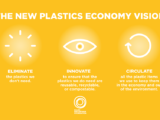Europe Flexible Packaging Market – Growth, Trends, COVID-19 Impact, Forecasts (2021-2026)
November 28, 2021The Europe Flexible Packaging Market has been valued at USD 52. 59 Billion in 2020 and is expected to grow at a CAGR of 3. 01% during the period 2021-2026. The Covid-19 pandemic resulted in a growing demand for flexible packaging in the region due to new or heightened hygiene and consumer-safety concerns and the drive for redefined sustainability.
Reportlinker.com announces the release of the report
“Europe Flexible Packaging Market – Growth, Trends, COVID-19 Impact,
Forecasts (2021-2026)” – https://www.reportlinker.com/p06184944/?utm_source=GNW
Technological innovation, sustainability trepidations, and attractive economics
are the major factors driving the growth of innovative and more sustainable,
flexible packaging. Also, the increasing market demand for customer-friendly
packages and heightened product protection is expected to drive the growth of
the market in Europe.
Key Highlights
The need for longer shelf life, increased adoption of flexible packaging over
rigid packaging, demand for lightweight products, and changing lifestyle of
people in Europe have been the primary drivers of the market. As flexible
packaging is known to have better barrier capabilities, it can effectively
protect the product from moisture and oxygen, which is particularly important
in the pharmaceutical industry, where the production capacity is of prime
importance.
Various food and beverage manufacturers have been turning to flexible packing
to add convenience and improve the consumer experience. Also, the price of the
pouches is lower and provides high convenience, which has increased the demand
for pouches across the region. In the food industry, beyond convenience, the
other characteristics, such as sustainability, transparency, food safety, and
reduction in food waste, are influencing the flexible packaging choice for
meat, poultry, and seafood.
The growth of the e-commerce industry and the increasing need for convenience
are shaping new customer expectations in Europe. Some E-commerce and home
delivery businesses are experiencing a massive boost during the pandemic, where
packages require better impact and puncture resistance, driving a shift from
rigid to flexible packaging for liquid products, as enhanced integrity is
required with e-commerce purchases, thereby driving the growth of the market in
the region.
The consequences of the financial crisis on the consumer’s purchasing power,
rising prices of the commodities, and other such factors can be challenging to
the market in Europe. Also, there are some environmental concerns about
recyclability and sustainability, which may slightly hamper the growth of the
market due to the common use of plastic material for flexible packaging.
Furthermore, regulations with respect to disposal and recycling are becoming
stringent in several European countries, which might be challenging to several
vendors in the region.
With the covid-19 pandemic, restaurants have shifted to take-away and food
deliveries during lockdowns, driving the demand for packaged food, such as
Frozen meat, fish, etc., which increased the need for flexible packaging. Also,
the use of at-home refill packaging for home and personal care products has
generated a new potential for flexible plastic refill pouches that minimize
shipping weight and parcel size in transit.
Key Market Trends
Flexible Packaging is expected to play a major role in E-Commerce Industry that
is growing significantly in the region.
The COVID-19 pandemic has enhanced the growth of the E-commerce industry that
many of the online shopping habits European consumers adopted over lockdown.
Moreover, with increased E-commerce intensifying consumers’ concerns about
packaging, there has been an increasing demand for sustainable, flexible
packaging in the region.
Various companies have been focusing on expanding their portfolio to cater to
the demand for flexible packaging in Europe. For instance, Mondi has been
investing in its European operations to improve and grow its services to
customers, upscaling MailerBAG production to approximately 350 million bags per
year, responding to strong growth and customer demand for flexible packaging in
eCommerce. When used to replace standard plastic mailers, the company’s
scale-up in production is expected to have the potential to substitute
approximately 7,000 tonnes of plastic per year. Furthermore, in June 2021,
Mondi also expanded its paper-based MailerBAG range to replace plastic
packaging in e-commerce with a recyclable solution made of responsibly sourced,
renewable materials.
The E-Commerce industry requires flexible packaging such as bags, mailers, and
folders that use less material than similar-sized boxes, weigh less, and
conform around the product, taking up less space than a box during shipping.
This makes flexible packaging to pack more orders in each load, resulting in
fewer trips, less fuel burned, and a smaller carbon footprint. Such potential
advantages drive the demand for the market in the region.
The E-commerce industry has been growing significantly in Europe. According to
the PPRO payment service provider company, as of January 2020, Romania was the
country with the highest e-commerce growth in Central and Eastern Europe,
followed by Ukraine and Estonia. Russia had a greater B2C e-commerce operation
in Central and Eastern Europe, valued at USD 36 billion in 2020.
Flexible packaging is the lightweight alternative that can be used to eradicate
costs associated with production, damage, replacement parts, returns, waste,
and shipping by allowing material handlers to transport more products with
less, which is an ideal solution for e-commerce professionals working with a
tight budget. In addition, many small and medium enterprises in the region have
been looking for enhanced protection with extended shelf life against various
ways that food can be spoiled, such as air, moisture, and sunlight, thereby
driving the demand for flexible packaging.
United Kingdom witnesses significant growth opportunities in the market
The growing urban population in the United Kingdom, altering patterns in
lifestyle, including decreasing the amount of time spent on the preparation of
meals, is leading to a shift toward more processed, easily packed, and
pre-prepared foods and snacks, which is expected to propel the growth of the
market studied. Also, the rise in demand for packaged foods, ready-to-eat
foods, frozen foods, luxury foods is also likely to increase the demand for
flexible packaging solutions in the country, owing to its ability to extend the
shelf life of such products.
Moreover, the growth of e-commerce sales, increasing demand from the food and
beverage manufacturers for eco-friendly and recyclable packaging, increasing
demand for personalization of products have been driving the growth of
sustainable, flexible packaging solutions in the region.
Various vendors have been focusing on strengthening their position in flexible
packaging and broadening their sustainable solutions portfolio and extending
their reach across the region. In July 2021, ProAmpac acquired Ultimate
Packaging, a pioneer in flexographic and digitally-printed flexible packaging
based in the United Kingdom, to expand ProAmpac’s product portfolio. Ultimate
packaging specializes in developing innovative packaging solutions to increase
product shelf life, convenience, and recyclability across a range of product
sectors. With the acquisition, the company is looking forward to gaining
further growth opportunities in the region.
Due to the COVID-19 pandemic, the United Kingdom has witnessed lockdown
restrictions, which led to panic buying, which imposed massive pressure on the
FMCG companies to adopt flexible packaging solutions, as the food companies have
increasingly witnessed an inclination towards pre-packaged food in smaller,
consumer-sized packaging. Furthermore, as flexible packaging increases the
product’s shelf life, customers have preferred flexible packaging in the
region.
The growing public consciousness around sustainability has led to an enormous
change among UK consumers that paper-based packaging is more sustainable than
plastic. In 2020, paper and board consumption in the United Kingdom amounted to
9.9. million metric tons, of which 5.6 million metric tons were consumed for
packaging, which represented more than 50% of total paper and board
consumption. Also, the British Plastics Federation (BPF) issued guidelines for
pharmaceutical, food, drink, and cosmetic packaging to measure recycled content
by including recycled packaging content in their packaging solutions. This has
increased the demand for sustainable and recyclable flexible packaging
offerings by various vendors in the region.
Competitive Landscape
The Europe Flexible Packaging Market is concentrated and is dominated by a few
major players like Amcor PLC, Mondi Group, Wipak Group, Sealed Air, and
Constantia Flexibles. These major players have a prominent share in the market,
and are focusing on expanding their customer base by leveraging strategic
collaborative initiatives to increase their market share and profitability.
With better technological advancements and product innovations, mid-size to
smaller companies are growing their market presence in Europe by securing new
contracts and by tapping new markets.
June 2021 – Mondi Group expanded its range of plastic-free eCommerce packaging
with MailerBAG range of sustainable paper solutions, which is fully recyclable
in existing paper waste streams and replaces the need for plastic packaging.
The company also recently invested in its European plants to deliver
approximately 350 million paper bags per year for the online retail industry.
Also, in the same month, Mondi’s paper-based EcoWicketBag won gold in the 2021
EUROSAC Grand Prix for its overall performance, reduction of CO2 emissions, and
convenience for the customer.
March 2021 – Amcor won two Flexible Packaging Association (FPA) achievement
awards for developing and producing innovative packaging technologies for its
customers. Amcor dual-chamber pouch secured Gold achievement award for
technical innovation, and Shield Pack clear high-barrier aseptic IBC liner
garnered Gold achievement award for technical innovation. This technology
extends distribution range, improves product quality and color, reduces transit
failures, all while delivering other important attributes, such as extended
shelf-life, durability, and clear packaging format.

